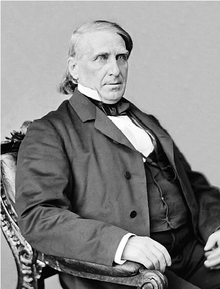
Back إليهو ب. واشبورن Arabic اليهو ب. واشبورن ARZ الیهو بی. واشبورن AZB Эліяху Бенджамін Уошберн Byelorussian Elihu B. Washburne Danish Elihu Benjamin Washburne German Elihu B. Washburne Spanish الیهو بنجامین واشبرن Persian Elihu B. Washburne Finnish Elihu B. Washburne French
Elihu Washburne | |
|---|---|
 | |
| United States Minister to France | |
| In office March 23, 1869 – September 5, 1877 | |
| President | Ulysses S. Grant Rutherford B. Hayes |
| Preceded by | John Dix |
| Succeeded by | Edward F. Noyes |
| 25th United States Secretary of State | |
| In office March 5, 1869 – March 16, 1869 | |
| President | Ulysses S. Grant |
| Preceded by | William H. Seward |
| Succeeded by | Hamilton Fish |
| Dean of the United States House of Representatives | |
| In office March 4, 1863 – March 6, 1869 | |
| Preceded by | John S. Phelps |
| Succeeded by | Henry L. Dawes |
| Member of the U.S. House of Representatives from Illinois | |
| In office March 4, 1853 – March 6, 1869 | |
| Preceded by | William Bissell |
| Succeeded by | Horatio C. Burchard |
| Constituency | 1st district (1853–63) 3rd district (1863–69) |
| Personal details | |
| Born | Elihu Benjamin Washburne September 23, 1816 Livermore, Massachusetts (now Maine), U.S. |
| Died | October 22, 1887 (aged 71) Chicago, Illinois, U.S. |
| Resting place | Greenwood Cemetery, Galena, Illinois |
| Political party | Whig (before 1856) Republican (1856–1887) |
| Spouse | Adele Gratiot |
| Children | 7, including Hempstead |
| Education | Maine Wesleyan Seminary Harvard University |
| Signature | |
Elihu Benjamin Washburne (September 23, 1816 – October 22, 1887) was an American politician and diplomat. A member of the Washburn family, which played a prominent role in the early formation of the United States Republican Party, he served as a congressman from Illinois before and during the American Civil War. He was a political ally of President Abraham Lincoln and General (later President) Ulysses S. Grant. During Grant's administration, Washburne was the 25th United States Secretary of State briefly in 1869, and was the United States Minister to France from 1869 to 1877.
In his youth, when his family became destitute, Washburne left home in Maine at the age of 14, to support himself and further his education. After working for newspapers in Maine and studying law, Washburne passed the bar and moved to Galena, Illinois, where he became a partner in a successful law firm. Washburne was elected to the U.S. House of Representatives in 1852 and served from 1853 to 1869, which included the American Civil War and the first part of Reconstruction. While advocating Lincoln's war policy, Washburne sponsored an up-and-coming Grant; they were acquainted because Grant had moved to Galena shortly before the war to work in his father's leather goods business. Washburne advocated for Grant's promotions in the Union Army, and protected him from critics in Washington and in the field. Washburne was Grant's advocate in Congress throughout the war, and their friendship and association lasted through Grant's two terms as president.
As a leader of the Radical Republicans, Washburne opposed the Reconstruction policies of President Andrew Johnson and supported African American suffrage and civil rights. Washburne was appointed United States Secretary of State in 1869 by President Grant, out of respect for his championship of Grant's career during the Civil War, and to give Washburne diplomatic clout after being appointed minister to France. Washburne's tenure as Secretary of State lasted for only eleven days, but he served in France for eight years, where he became known for diplomatic integrity and his humanitarian support of Americans, other neutrals, and Germans in France during the Franco-Prussian War. For his efforts, he received formal praise from governments in both France and Germany. Washburne's friendship with Grant ended after the contentious 1880 Republican convention, when Washburne was a candidate for president. He did not garner wide support, but Grant had been the front runner for an unprecedented third term, and was disappointed when the party eventually turned to dark horse James A. Garfield. In retirement, Washburne published a biography of anti-slavery politician Edward Coles, and a memoir of his own diplomatic career in France.
© MMXXIII Rich X Search. We shall prevail. All rights reserved. Rich X Search